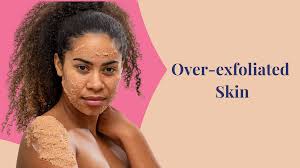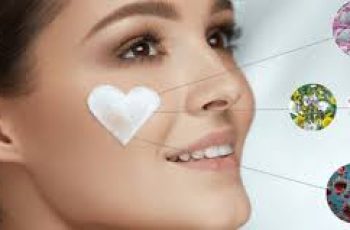Over Exfoliated Skin: What To Do When You Scrub Too Much
Are you over exfoliated because you scrubbed your face too hard or used too many exfoliants in your skin care routine? If so you may have skin bumps, skin stinging, a rash, or even worse – scabs. If your skin hurts or is purging after over exfoliating, this blog will tell how what to do. I always explain to my patients with dry and sensitive skin not to over exfoliate. It is so easy to over exfoliate when you use a facial brush, too many exfoliants, or you are using Vitamin C or retinoids.
My advice is to take our skin type quiz and review the custom skincare routine we will give you so you can see how many exfoliants should be in your skin routine to avoid over-exfoliation.
Overexfoliating Skin
If you use a rough washcloth and rub too hard, or you overuse a facial brush or facail scrub, this thins the top layer of the skin. Your skin in most cases does not need much help exfoliating. You see- your skin naturally exfoliates in a process called desquamation. Also, many skin care products have ingredients that exfoliate skin even when they are not described as exfoliants. This is why it is very easy to over-exfoliate! For example- did you know that Vitamin C exfoliates skin? Adding Vitamin C to a regimen that already has 2 exfoliants can lead to skin inflammation so that your skin actually hurts and becomes sensitive.
To avoid over exfoliating you should not use more than 2 exfoliants in your daily skincare routine. You can find a list of skincare products that are exfoliants here.
It is Bad to Exfoliate Too Much
Over exfoliation is bad for skin because it disrupts the keratinization process.
You do not want to over-exfoliate because that can lead to skin problems such as dryness and acne.
Over-exfoliating can damage your skin by:
injuring your skin barrier
disrupting the normal keratinization process
causing inflammation
Skin Types at Risk For Over Exfoliation
There are certain skin types that need to be careful when they exfoliate to avoid causing skin problems. When you take our skin type quiz, we will tell you which Baumann Skin Type you are and give you advice on products, your skin, and your routine. There are 12 of the 16 Baumann Skin Types need to worry about over exfoliating. Take the skin type quiz to get a custom routine, shop by your skin type, see and how many exfoliants you should use.
ensitive Skin
Very sensitive skin types are at a high risk of over-exfoliation- especially acne, rosacea and stinging skin types. Unless we tell you otherwise in your custom skincare routine, you should not exfoliate with scrubs and peels that are not in your daily routine. Most resistant skin types can exfoliate 2-3 times a week, and resistant skin types can exfoliate 2 times a day.
Dry Skin
Exfoliating can dry out your skin- so do not use any exfoliators that we do not recommend in your custom skin care regimen. Always exfoliate less in the winter when the climate is dry and cold, because you need the top layers of the skin to help your hold onto water.
Signs of Over Exfoliated Skin
How To Know If You Are Over-Exfoliating Your Skin? There are signs of over exfoliation that should warn you to stop exfoliating. Over exfoliated skin can have stinging, itching, skin bumps, and redness. Over exfoliating can cause breakouts and too much exfoliation can even lead to large pores.
Signs of over exfoliation are:
acne breakouts
purging
skin bumps
clogged pores
scabs
sensitive skin
shiny skin
skin dehydration
stinging skin
tender skin
Treatments for over exfoliated skin
Treating Hyperexfoliated Skin
Treating over-exfoliated skin properly is important to prevent purging, bumps and other side effects from exfoliation.
If you have over exfoliation damage, these are the 10 steps to treat and soothe the skin.
Remove all exfoliants from your skin care routine until your skin returns to normal.
Do not use Vitamin C
Do not use hydroxyacids
Do not use retinoids like retinol
Do not use a facial brush or loofa or scrub
Apply a soothing barrier repair moisturizer such as Zerafite Soothing and Calming Face Cream.
Apply a soothing oil such as Argan Oil overnight or a soothing mask.
Use a gentle non-foaming cleanser and cleanse with cool or room temperature water- not hot.
Avoid friction
Avoid extreme temperatures like cold or hot water
Best Moisturizers to Treat Over-exfoliated Skin
These moisturizers have soothing ingredients, ceramides, fatty acids, and cholesterol that help repair your skin barrier.
[[M04]]
Best Soothing Oils
These oils containing anti-inflammatory fatty acids that help soothe skin. This are best for dry skin types that have exfoliated too much.
[[T10]]
Best Soothing Masks
These masks can be used every night until your skin feels better.
[[MK06]]
When Will Over Exfoliated Skin Heal
How long to heal over exfoliated skin? Over exfoliated skin will take 1- 5 days to heal depending on how severe it is. If you stop all exfoliants, the skin should begin to feel better in 2 days. It may take an entire week to heal. If your skin is stinging or itching, applying a soothing oil overnight can help. Give your skin 2 weeks before restarting any exfoliating skin care products.
Scabs from over exfoliation can take 5 days while shininess goes away in 1-2 days. Bumps from exfoliation can take a week or more to heal depending on your skin type and how over exfoliated you are.
Exfoliating too much or incorrectly can damage your skin. This why you need to get skincare routine advice from us for your Baumann Skin Type® .This will keep you from wasting time and money on the wrong skin care products and too many exfoliants.
DQH Knowledge drop: In your 20s, your skin cell turnover decreases. (Cell turnover is a key component in keeping your skin youthful.) You know what else slows down? Your collagen production. Starting in your 20s, collagen decreases by about 1 percent per year. Should you want to prevent fine lines and wrinkles, start by eliminating behaviors that contribute to premature aging. “If it’s bad for you, it’s bad for your skin,” says dermatologist Michel Somenek.
“Cigarette smoking reduces blood flow to the skin and causes premature wrinkling and a dull skin texture. Making the repeated pursed motion to inhale can also cause smoker’s lines. Alcohol and recreational drugs are toxins for the skin that damage its cellular structure and DNA,” Somenek tells us. “The faster you eliminate vices while you are young, the better chance your skin and body have to recuperate.” Also, adopting an anti-aging routine in your 20s is key. After all, the best offense is a good defense. We spoke to Somenek and experts Joshua Ross and Audrey Kunin to find out more.
Keep reading for the best anti-aging products for your 20s, according to skincare professionals.
Sunscreen
“We all know that the sun is the number one cause of skin aging and starting the prevention in your 20s is very important,” Ross says. “The majority of your sun damage won’t start to appear until you’re in your 30s, so don’t wait until you see it surface or you’ll be behind the curve. Stay ahead of it with a good-quality zinc-based sunscreen worn daily.”
Farmacy Green Defense Daily Mineral Sunscreen
An invisible sunscreen with SPF 30, plus botanical extracts meant to protect skin with tons of antioxidants. Bonus: It’s clean and fine to use under makeup.
Bareminerals Complexion Rescue™ Tinted Moisturizer Broad Spectrum SPF 30
Although we recommend you use your SPF and moisturizer separately, we also understand moments when you don’t have time or energy for that extra step. For those times, this bareMinerals moisturizer is a great thing to have on hand.
Vitamin C Serum
“A great introduction to anti-aging is to start with a vitamin C serum in your morning skincare routine,” Ross says. “It’s a powerful antioxidant that will neutralize free radicals and brighten the skin.” He adds that it’s a great way to counteract the effects of the sun’s harmful rays, which, as previously mentioned, are among the biggest causes of premature aging.
Drunk Elephant C-Firma™ Vitamin C Day Serum
The Drunk Elephant C-Firma is a lightweight serum that promises to give skin a glow by combining the brightening powers of vitamin C with ferulic acid, l-ascorbic acid, and vitamin E. The included sodium hyaluronate is meant to replace hydration loss, so you shouldn’t have to deal with any irritation.
Sunday Riley C.E.O. Rapid Flash Brightening Serum
This potent serum is jam-packed with vitamin C (15 percent, to be exact), which means it’s a potential superstar at both brightening skin and dousing it in antioxidants.
Peptides
Using peptides on your skin has many benefits, says Somenek. “The skin barrier is what defends the body against pollution, UV rays, bacteria, and toxins. It can be damaged by several everyday factors. Using topical peptides aids in building a stronger barrier,” he says. “Peptides comprise elastic fibers, which are a type of protein. These fibers help to make skin appear taut and firm. Peptides can also help repair damaged skin, relieve inflammation, and even out skin tone. Some peptides can kill acne-causing bacteria that is common in 20-somethings.”
Kunin agrees, saying, “Peptides are an excellent entry point for supporting collagen.” She recommends looking for face and eye treatments that contain these collagen-boosting powerhouses.
Charlotte Tilbury Magic Eye Rescue Cream
This Charlotte Tilbury super-emollient eye cream has a base of coconut oil and shea butter (read: it’s incredibly hydrating). Botanicals plus peptides are meant to help reduce dark circles and boost collagen, respectively.
This creamy moisturizer serves up potent collagen-boosting peptides and pycnogenol, and antioxidant-rich vitamin C. “Instead of sitting on top of the skin, peptides penetrate the outer layer so they go deep. The ‘signals’ they send tell the cells to produce elastin and collagen, which are needed for youthful-looking skin,” explains Somenek.
At-Home Peel Pads
Remember that skin cell turnover fiasco we talked about earlier? One way to help support it is by exfoliating. “Exfoliation is important to help keep skin fresh and luminous,” Kunin says. She recommends using at-home peel pads as an easy and effective way to exfoliate.
“The goal in your 20s is to fight the slowing pace of cell turnover. It is wise to use products that gently exfoliate, yet still remove oil and other impurities. Products that have Alpha Hydroxy Acids (AHA) or Beta Hydroxy Acids (BHA) are a good choice.”
According to Somenek, you should only exfoliate two to three times a week. “People of all ages are guilty of over-exfoliating and that can be too much of a good thing,” he says.
Dermadoctor Kakadu C Intensive Vitamin C Peel Pad
A few swipes of this Derma Doctor powerful peel pad promise to leave your skin glowing and smooth, thanks to the seven (yes, seven) types of chemical exfoliants, including AHA and BHA. It also contains vitamin C via Kakadu plum extract for added brightening and antioxidant protection.
KEY INGREDIENTS Kakadu plum extract is sourced from the Kakadu plum, a fruit grown in northern Australia. It contains vitamin C, which restores the skin’s natural barrier, increases collagen production, and soothes irritation.
Dr. Dennis Gross Skincare Alpha Beta® Universal Daily Peel Pads
These are the gold standard of peel pads, with a cult following and over 900 five-star reviews on Sephora. They’re easy to use and contain a blend of anti-aging exfoliating acids.
Emollient Night Cream
“In your 20s, you need to start upping the hydration in your skincare routine. You may have been cautious of over-moisturizing because of acne in your teens, but as you enter your 20s, your skin transitions and becomes drier,” Ross says. “I recommend an emollient night cream added into your evening skincare regimen.”
“Twenty-somethings need to make sure that they are not using creams that will clog their pores and cause excess oil production,” says Somenek. Opt for non-comedogenic products.
Cerave Skin Renewing Night Cream
One great choice is the CeraVe Skin Renewing Night Cream, which is a non-comedogenic night cream that leaves skin soft and glowy. It combines the moisturizing powers of ceramides and hyaluronic acid.
RoC Retinol Correxion Max Hydration Creme
“The best night cream ingredients contain retinol, benzoyl peroxide, and/or salicylic acid or hyaluronic acid. The goal is to moisturize, yet remove excess oil,” says Somenek. This Roc Retinol Correxion cream fits the bill as it contains both hyaluronic acid and retinol so it promises to moisturize while also being non-comedogenic.



